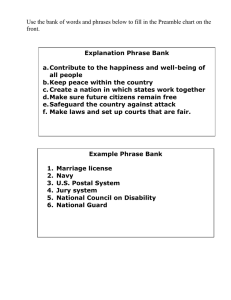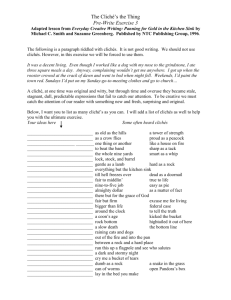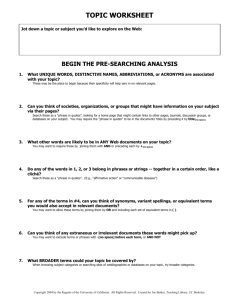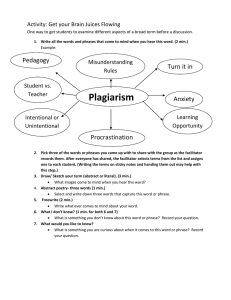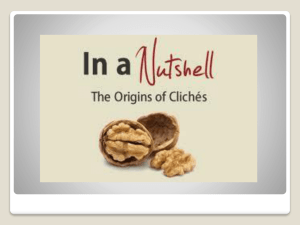Elements of Style Workshop --Curing Your Cliché Woes--
advertisement
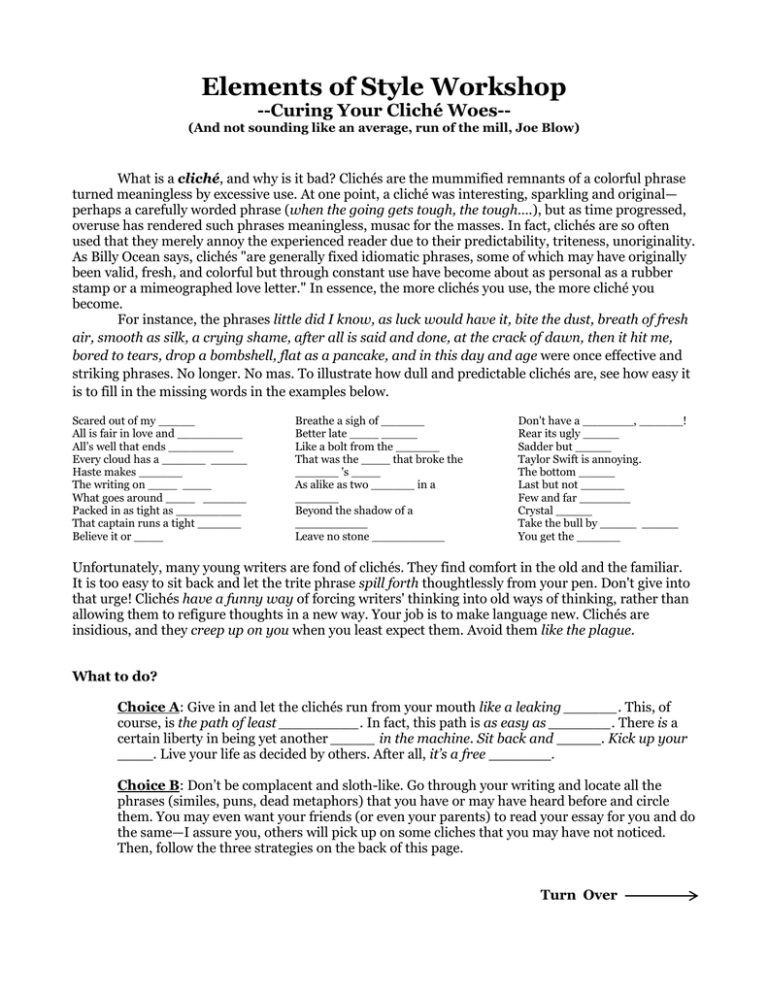
Elements of Style Workshop --Curing Your Cliché Woes-- (And not sounding like an average, run of the mill, Joe Blow) What is a cliché, and why is it bad? Clichés are the mummified remnants of a colorful phrase turned meaningless by excessive use. At one point, a cliché was interesting, sparkling and original— perhaps a carefully worded phrase (when the going gets tough, the tough….), but as time progressed, overuse has rendered such phrases meaningless, musac for the masses. In fact, clichés are so often used that they merely annoy the experienced reader due to their predictability, triteness, unoriginality. As Billy Ocean says, clichés "are generally fixed idiomatic phrases, some of which may have originally been valid, fresh, and colorful but through constant use have become about as personal as a rubber stamp or a mimeographed love letter." In essence, the more clichés you use, the more cliché you become. For instance, the phrases little did I know, as luck would have it, bite the dust, breath of fresh air, smooth as silk, a crying shame, after all is said and done, at the crack of dawn, then it hit me, bored to tears, drop a bombshell, flat as a pancake, and in this day and age were once effective and striking phrases. No longer. No mas. To illustrate how dull and predictable clichés are, see how easy it is to fill in the missing words in the examples below. Scared out of my _____ All is fair in love and _________ All’s well that ends _________ Every cloud has a ______ _____ Haste makes ______ The writing on ____ ____ What goes around ____ ______ Packed in as tight as _________ That captain runs a tight ______ Believe it or ____ Breathe a sigh of ______ Better late ____ _____ Like a bolt from the ______ That was the ____ that broke the ______ 's ____ As alike as two ______ in a ______ Beyond the shadow of a __________ Leave no stone __________ Don't have a _______, ______! Rear its ugly _____ Sadder but _____ Taylor Swift is annoying. The bottom _____ Last but not ______ Few and far _______ Crystal _____ Take the bull by _____ _____ You get the ______ Unfortunately, many young writers are fond of clichés. They find comfort in the old and the familiar. It is too easy to sit back and let the trite phrase spill forth thoughtlessly from your pen. Don't give into that urge! Clichés have a funny way of forcing writers' thinking into old ways of thinking, rather than allowing them to refigure thoughts in a new way. Your job is to make language new. Clichés are insidious, and they creep up on you when you least expect them. Avoid them like the plague. What to do? Choice A: Give in and let the clichés run from your mouth like a leaking ______. This, of course, is the path of least _________. In fact, this path is as easy as _______. There is a certain liberty in being yet another _____ in the machine. Sit back and _____. Kick up your ____. Live your life as decided by others. After all, it’s a free _______. Choice B: Don’t be complacent and sloth-like. Go through your writing and locate all the phrases (similes, puns, dead metaphors) that you have or may have heard before and circle them. You may even want your friends (or even your parents) to read your essay for you and do the same—I assure you, others will pick up on some cliches that you may have not noticed. Then, follow the three strategies on the back of this page. Turn Over 3 Strategies 1. First, you can simplify the phrase. It's not colorful, but it is better than using a cliché and labeling yourself as an unoriginal writer who can't think of a better way to phrase a simple idea. "A bolt from the blue" would then become "a shock" "beyond the shadow of a doubt" would then become "undoubtedly" "Swept under the rug" would then become "concealed" "As pure as the fresh driven snow" would then become "immaculate" 2. A bit more advanced technique is to take the trite phrase and give it a slight twist, a minor tweak that radically changes the meaning of the phrase. Doing so breathes new life into dead language by making it de-familiarized; the reader encounters the words anew for the first time and becomes pleasantly surprised. For instance, G. K. Chesterton wrote, "If a thing is worth doing, it is worth doing badly." Talulah Bankhead wrote, "I am as pure as the fresh driven slush." Another writer, Tom Bethel, avoided a Shakespearean cliché by writing, "Washington is Thunder City--full of sound and fury signifying power." Sometimes, the new phrase made by refashioning a cliché may make a good title. One James Bond film, far too action-packed to live and let live, decided to Live and Let Die. Such verbal slight-of-hand is available to any student who takes the time. One student, writing about bombing technology, concluded, "That's the whole thing in a bombshell," cleverly twisting the cliché about nutshell. Another student who was writing about animal research realized that the phrase "on the other hand" was becoming repetitive in his paper. He stirred up the language pot and wrote "on the other paw" in reference to an animal. It was a bit too cute for some tastes, but all the other readers in class who encountered his twist on the cliché loved it. 3. Finally, the best (and hardest) way to cure a cliché is to make up an entirely new image or phrase, one you have never heard before but which expresses the same idea. Either think of an image that startles the reader by its unexpectedness or one that connotes appropriate emotional resonances in the reader. Simple: “You can’t run away from your past” or your “past will catch up to you” becomes “Scars have the strange power to remind us that our past is real” –All the Pretty Horses by Cormac McCarthy Complex: “When the going gets tough the tough get going” becomes “The man who believes that the secrets of the world are forever hidden lives in mystery and fear. Superstition will drag him down. The rain will erode the deeds of his life. But that man who sets himself the task of singling out the thread of order from the tapestry will by the decision alone have taken charge of the world and it is only by such taking charge that he will effect a way to dictate the terms of his own fate.” –Blood meridian by Cormac McCarthy
